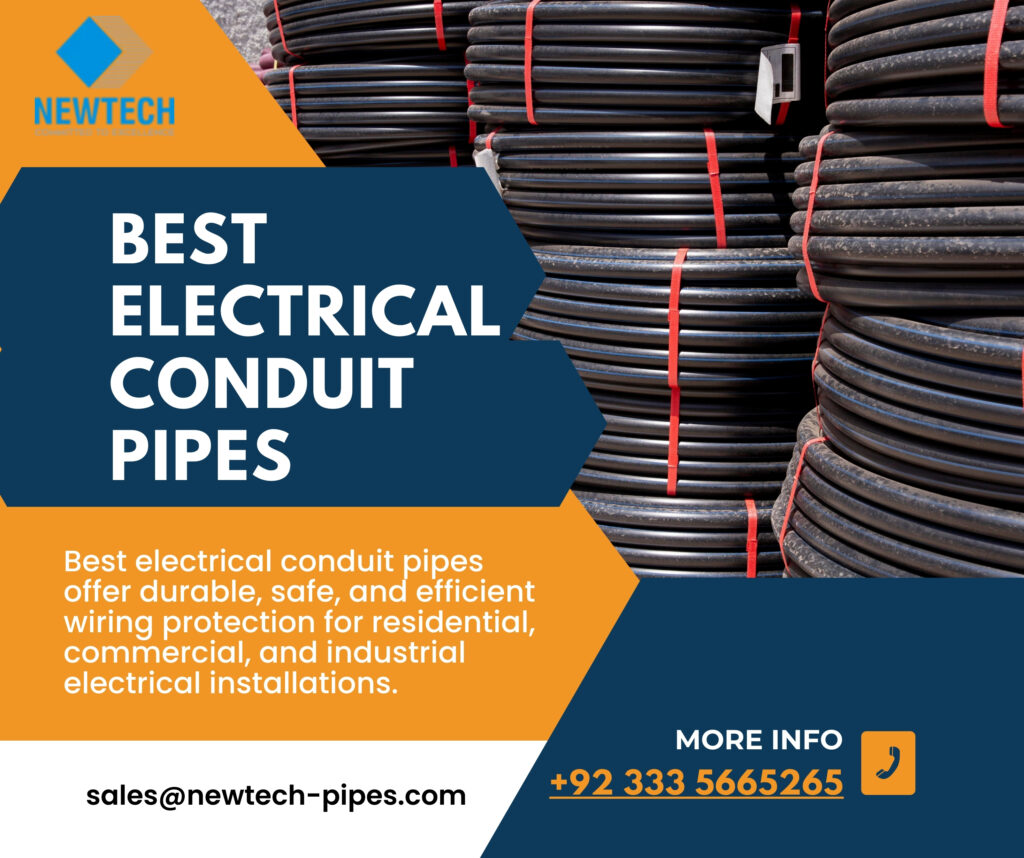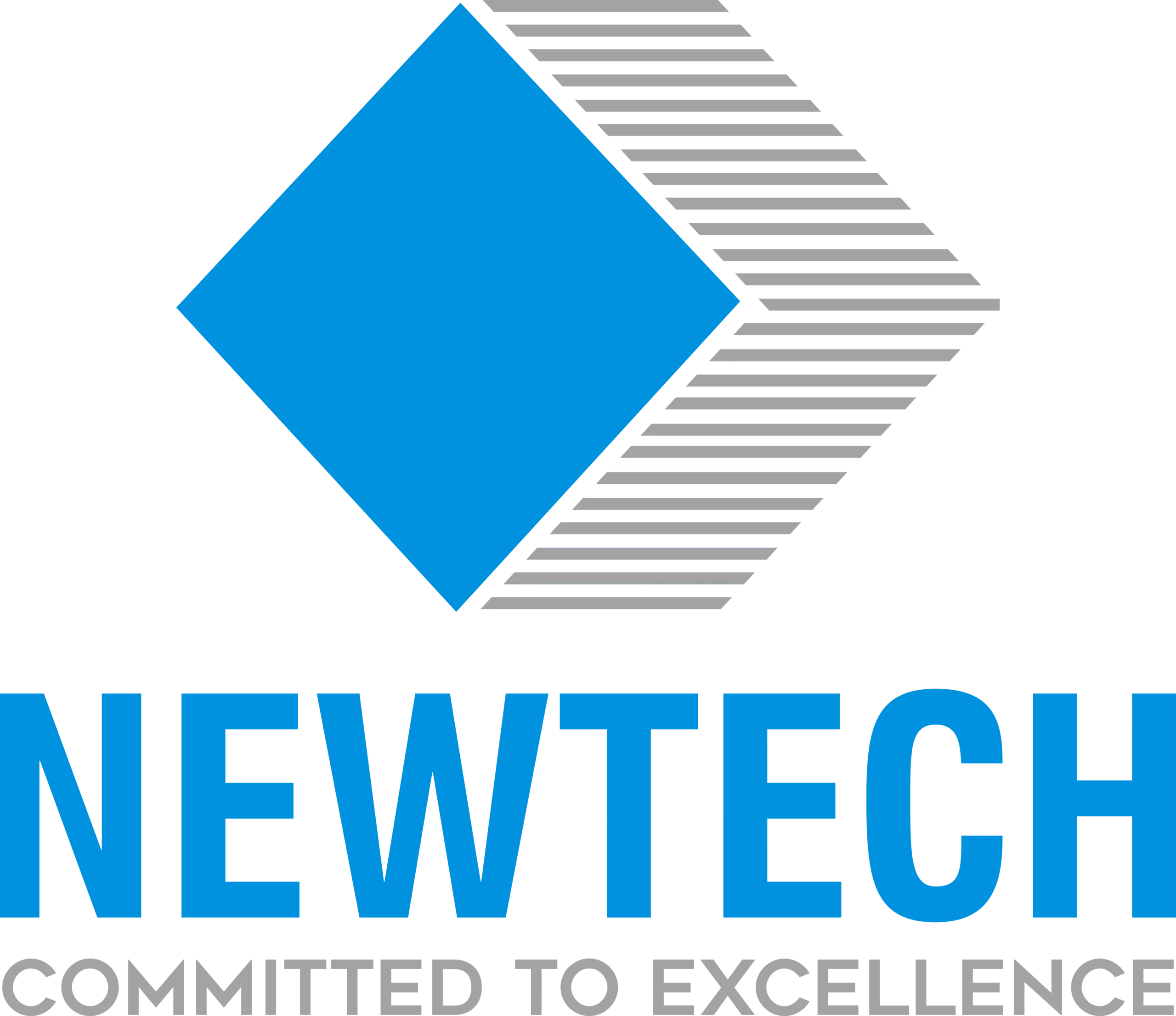Electrical conduit is the physical backbone of every contemporary building—residential, commercial, or industrial. Having the electrical wiring safe and operational in the future starts with selecting the optimal conduit pipe type. At New Tech, we appreciate the significance of having the optimal conduit system for safeguarding wiring from climatic threats, mechanical stress, and fire danger. This blog discusses the optimum electrical conduit pipes for secure and durable wiring installations, particularly in economies like Pakistan where climatic, humidity, and load conditions are highly fluctuating.
What Is an Electrical Conduit Pipe?
An electrical conduit pipe is an encasing tubing system used for the routing and protection of electrical wiring inside a building or facility. It protects wires from moisture, corrosion, impact, and fire and gives physical protection along with a clean organizational system to electrical infrastructure.
Types of Electrical Conduit Pipes:
There are different conduit pipes employed globally, each tasked with addressing particular installation and environmental requirements. Below are the most applied along with their strengths and weaknesses.
1. PVC Conduit Pipes:
Polyvinyl Chloride (PVC) pipes are among the most applied and utilized at home and in businesses.
Strengths:
- Light and simple to install
- Resistant to corrosion and moisture
- Affordable
- Flame-resistant
Weaknesses:
- Should not be applied in high-heat settings
- Could become brittle over time when exposed outside without UV protection
- Best Use: Indoor wiring in buildings and offices, concealed conduit systems
2. HDPE Conduit Pipes:
HDPE conduits are flexible and long-lasting.
Advantages:
- Excellent flexibility
- High impact and crush resistance
- UV resistant
- Chemical and corrosion resistant
Disadvantages:
- Not fireproof
- More costly than PVC
Best Use: Underground installations and outdoor wiring systems
3. EMT Conduit Pipes:
Electrical Metallic Tubing (EMT) is a lightweight metal conduit typically constructed of galvanized steel or aluminum.
Pros:
- Stronger than plastic conduits
- Good for grounding
- Easy to bend and shape
- Clean, professional finish
Cons:
- Can corrode if improperly treated
- Requires specialized tools for cutting and bending
- Heavier and more expensive than PVC
Ideal Use: Commercial buildings, industrial applications, exposed indoor wiring
4. Rigid Metal Conduit (RMC):
RMC is the thickest and heaviest metal conduit type, composed of galvanized steel or stainless steel.
Pros:
- Highest protection against mechanical damage
- Most weather-resistant and most durable
- Appropriate for grounding
Cons:
- Extremely heavy and pricey
- Difficult to install
- Requires threading tools and skilled labor
Best Use: Outdoor installations, industrial locations, hazardous environments
5. Flexible Metal Conduit (FMC):
FMC is made of metal coiled together that can be bent without any trouble, utilized primarily where flexibility is required.
Advantages:
- Easy to route along complicated or confined areas
- Withstands vibration
- Fast installation
- Drawbacks:
- Less secure than rigid conduits
- Not for wet locations or waterproofing
Ideal Use: Equipment connections, concealed ceilings, portable machinery
Key Safety Features to Consider:
The decision of the most suitable electrical conduit pipe is not merely about price and convenience. Safety is paramount. The following are the principal safety considerations to watch out for:
Fire Resistance:
Conduit pipes must be self-extinguishing and flame-resistant so that fire cannot be transmitted around the whole electrical system. PVC and metal conduits are generally successful in stopping fire when put through tests for safety.
Impact Strength:
Protection mechanically is crucial in commercial and industrial spaces. RMC and HDPE conduits are impact-resistant as much as any conduits would be and so suitable for exposed zones.
Water and Chemical Resistance:
Where application in wet ground or chemical-vulnerable areas takes place, water and corrosion resistance in conduit pipes becomes a requisite. HDPE and PVC will suit such needs best.
Electrical Insulation:
PVC and HDPE non-metallic conduits inherently provide electrical insulation, reducing the risk of electrical shocks and system failure.
Grounding Capability:
EMT and RMC metallic conduits can be used as grounding paths, a safety feature in commercial electrical systems.
Durability Considerations:
Longevity is the biggest concern with installing a conduit system. Following are what add to conduit longevity:
Material Quality:
Higher-quality HDPE or galvanized steel, or UV-stabilized HDPE will stay tough for longer and provide an additional amount of protection. Choose brands of known repute in following global standards.
Installation Environment:
Stressful indoor or hidden locations can be employed with PVC or EMT. Tougher ones like HDPE or RMC need to be installed for outdoor or industrial environments.
Load and Vibration:
Vibration-producing structures or machinery can lead to deterioration of brittle conduit systems over the long term. Flexible conduit or metallic types are better in these situations.
Weather and UV Exposure:
- Sunlight and rain degrade certain plastics.
- Outdoor laying conduits – use coated RMC or UV-stabilized HDPE.
- Top Conduit Pipe Choices by Use Case
To make it simple, here’s the top conduit choices by installation requirement:
For Residential and Flats:
Top Pick: PVC conduit
Why: Inexpensive, fire-resistant, corrosion-resistant, and simple to install
Offices and Commercial Buildings:
Top Pick: PVC or EMT based on appearance and exposure
Why: EMT offers more strength and grounding; PVC is less expensive and simpler to install
Permanent Safety Installation Hints:
The right installation is as vital as the right pipe. New Tech’s expert tip is as follows:
Don’t Bend Too Much:
Excessive bending will stress the conduit and lead to future breaks or cracks. Utilize proper bending equipment and techniques.
Use Correct Fittings and Joints:
Use authorized couplings, elbows, and junction boxes to ensure the integrity and strength of the system.
Ensure Clearance from Heat Sources:
Support boilers, ovens, or other heat-generating units via conduits except when using heat-resistant pipes such as RMC.
Strap and Bolt Mount:
Support conduits on walls or ceilings through heavy-duty brackets or clips. Loose support leads to wear and short circuits.
Inspect Periodically:
Regular visual inspection, particularly in industrial installations, can avoid expensive breakdowns due to unnoticed corrosion or damage.
Cost and Environmental Factors:
Ecofriendly Alternatives:
HDPE and PVC conduits are recyclable and so are environment friendly. They have a longer life span, so they will need to be replaced fewer times and create less waste.
Cost and Performance:
Whereas RMC provides ultimate protection, its cost and level of installation complexity render it unsuitable for minor projects. PVC is still the value-for-money option for normal applications.
Why Use New Tech Conduit Systems?
Here at New Tech, we provide a variety of electrical conduit pipes that are specifically built to address Pakistan’s particular infrastructure and safety requirements. We produce our products under quality control to offer:
- Flame-resistant materials
- Chemical and UV resistance
- Standard mechanical strength
- Convenient installation with accessories
Whether you are wiring a residential house, a commercial plaza, or an industrial plant, New Tech has the perfect conduit pipe that fits your performance and budget demands.
Final Thoughts:
Electricity conduit systems are not merely cable management—these are your initial line of defense against system failure, shock, and fire. By using the right kind of conduit pipe and proper installation procedures, you guarantee that your electrical system is safe, efficient, and long-lasting for decades.
From RMC and HDPE heavy-duty materials to flexible PVC conduit, the options are vast—but what you really need is one that suits your particular application. New Tech will help you make the correct choice with our expert advice, our better-quality products, and our full support.


